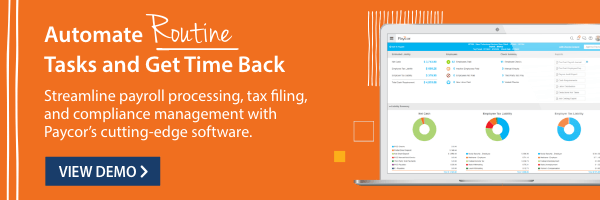Weekly, bi-weekly, monthly? Compensation planning isn’t just about how much you pay employees. It’s also about how often they get paid.
There are pros and cons to any payroll schedule. For a lot of new businesses, picking the right one is a major challenge. To find the right fit for your business, review these 10 important facts about pay periods.

What is a Pay Period?
A pay period is the ongoing schedule your payroll department follows to compensate employees. For any pay period you choose, employers should be consistent and transparent so employees can plan ahead.
There are several common pay periods, and each has its own advantages and disadvantages. There’s no right or wrong option here – just the one that works best for your business model.

Every Pay Period Has Pros and Cons
You may already know the most common pay periods are weekly, bi-weekly, semi-monthly, and monthly. And as an employee – even a manager – it’s easy to see how those periods affect your own life. But how do the affect your business?
Weekly Pay Periods:
Employees receive 52 paychecks annually – one for every week of the year. Payroll is scheduled to run on the same day every week, usually Thursday or Friday.
Pros:
- Frequent pay checks increase employee satisfaction
- Pay checks are easier to calculate
Cons:
- Most time-consuming for HR
Bi-weekly Pay Periods:
Employees get paid every other week, receiving 26 paychecks per year. Some months will have three pay periods. Leap years also make this complicated. Once a decade or so, the extra days from leap years add up, and employees need to receive a 27th paycheck.
Pros:
- Employees like getting paid more often
- Works well with large proportion of hourly employees
- More time/cost-efficient than weekly pay
Cons:
- Accounting is more demanding in months with 3 pay periods
- HR needs to calculate monthly benefit premiums on a bi-weekly schedule
- Pay dates change from month to month, which makes scheduling complicated
- The 27th check throws a wrench in the works, especially when it comes to taxes, benefits, and employee expectations
Semi-monthly Pay Periods:
Employees get 2 pay checks per month for a total of 24 per year. Employers typically issue checks on the 1st and 15th of the month, or the 15th and the last day of the month. However, you can also choose any two dates in a month that are spread equally apart.
Pros:
- Pay dates are predictable for both employers and employees
- No leap-year-causing complications
- Works well for exempt salaried employees
Cons:
- Calculating overtime can be challenging
- Doesn’t always work for hourly employees or those with unpredictable schedules
- Workweeks don’t align with pay cycles
- Dates sometimes change due to bank holidays
Monthly Pay Periods:
Employees receive 12 paychecks per year. Pay checks are issued on the same date every month, usually the first or last day of the month.
Pros:
- Easiest for employers to manage
- Cost-effective
- Time-saving
- Lowest administrative burden
Cons:
- Doesn’t work well for hourly workers
- Not great for employee budgeting or job satisfaction
- Dates sometimes change due to bank holidays
Related: Pay Frequency Requirements by State

HR can Define the Workweek
According to the Fair Labor Standards Act (FLSA), a workweek is a fixed period consisting of seven consecutive 24-hour periods, 168 hours in total (Cornell Law School). However, your workweek doesn’t have to start on a Monday. In some industries – like restaurants and entertainment – most workweeks begin on Tuesday or even Wednesday.
Curious about work week laws in your state? Check out this related article: Predictive Work Schedule Laws: A City-By-City Guide

Payroll Costs Vary
The way you process payroll makes a huge difference. The more frequently you run payroll, the more you’ll probably spend on processing and administration. For most businesses, weekly pay periods end up being the most expensive option. Monthly pay periods are generally the most affordable.

Admin is Expensive
Managing and processing payroll accurately can be time consuming. When you calculate the cost of payroll, consider the value of your own time. Are you spending hours every week poring over spreadsheets, or fixing human errors? The cost of your labor adds up quickly.
HR also needs to balance employees’ needs with those of the company. Monthly payroll cycles are less expensive, but they might lower job satisfaction and increase turnover. When you’re choosing the right payroll system, make sure you look at the big picture.

Different Pay Periods Work Better for Different Types of Employees
When you decide on a pay period, make sure to account for your team’s needs.
- Hourly employees usually prefer more frequent paychecks, especially when they have irregular schedules.
- Salaried, exempt employees tend to want bi-monthly, semi-monthly, or monthly pay checks because they’re more predictable.
If you have both hourly and salaried workers, you might need to accept that you can’t make everyone happy. Choose the option that works best for as many people as possible – including HR and the C-Suite.

Pay Periods Impact Your Budget
How does your specific business operate? When you’re choosing a pay period, make sure it works with daily operations. For instance:
- Are certain times of the month busier than others?
- Does cash-flow need to inform your selection?
- Do you anticipate lots of OT?

Overtime Laws Might Affect Payroll
According to the Fair Labor Standards Act (FLSA), overtime should be paid at 1.5x the regular hourly rate for any hours worked over 40 in a week (U.S. Department of Labor). Some states have additional requirements.
If you have a high proportion of non-exempt employees who are eligible to earn overtime, you may want to consider that as you choose your pay cycle. For example, if you pay semi-monthly on the 15th and the last day of the month, each pay period may have a different number of days. That could make running payroll more complicated.

Some States Have Pay Period Requirements
The federal government requires that you pay your employees on a regular basis but sets no guidelines as to how often that should be. Some states, on the other hand, do have minimum pay period requirements. Check with the Department of Labor in your state to verify laws and regulations.

Pay Periods Affect Taxes
Employers are required to withhold the appropriate amount of federal, state and local taxes from each employee paycheck. The more often you run payroll, the more often you’ll have to account for these line items. This ensures your monthly and quarterly payroll tax payments and reports will be accurate. If you fail to account for withholding, you can face serious fines and penalties.
How Paycor Helps
No matter what type of business you’re in, understanding the various scheduling options and the implications of each will help you determine the one that works best for you.
Ready to take the next step?
For nearly 30 years, Paycor has maintained core expertise in payroll and compliance. Our payroll software is a powerful, user-friendly tool that saves time for HR. Our expert tax team assists with complicated areas like payroll tax compliance and workers’ comp, so you can focus on paying your people. Contact us today to learn more about how our expert payroll and tax solution can help you pay your employees on time and avoid compliance missteps.





